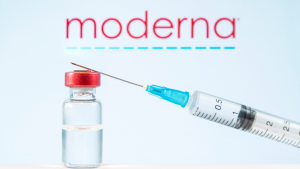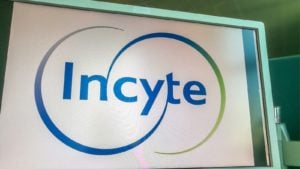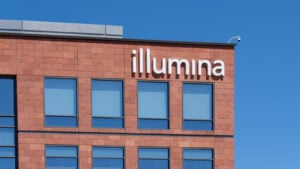The IQVIA Institute’s report addressed the productivity of clinical development and efforts to improve racial and ethnic representation in clinical trials. Despite advancements, the ecosystem faces challenges, like disparities in patient access to novel cancer medicines across different regions.
Moreover, the financial strain on healthcare budgets is intensifying. Projected spending on cancer medicines is anticipated to reach $375 billion globally by 2027. This is a significant rise from $196 billion in 2022. Emerging biopharma companies, defined by their smaller size, now lead innovation in oncology. They account for 71% of the current development pipeline. This shift underscores the changing dynamics within the oncology field, where smaller companies are increasingly pivotal.
Let’s take a look at these three cancer-fighting biotech stocks that are showing great potential.
Moderna (MRNA)

Moderna (NASDAQ:MRNA) is pioneering mRNA technology to develop transformative medicines. Its collaboration with Merck (NYSE:MRK) on a personalized cancer vaccine showcases significant progress. It demonstrated a 49% reduction in late-stage melanoma risk. As a result, MRNA stock surged in December following the announcement of promising results from this collaboration.
The updated data on the cancer vaccine, which is in a phase 3 trial in combination with Merck’s Keytruda, has been particularly encouraging. It shows an improvement from a 44% reduction in risk after two years to 49% after three years, based on a follow-up from a phase 2b trial.
Also, Moderna recently surpassed expectations in Q4 with a revenue of $2.8 billion and a GAAP net income of $217 million.
Moderna is currently advancing 40 products in its development pipeline, with seven in late-stage development. However, the company faced setbacks in bringing its RSV vaccine to market in time to compete with Pfizer (NYSE:PFE) and GSK (NYSE:GSK) this year. Despite projections of a $100 billion portfolio next year, driven by its flu, RSV, and COVID-19 vaccines, these expectations have been postponed until the flu vaccine is introduced.
Moderna stock is down 6.3% year to date (YTD) and 35.3% over the last 52 weeks.
Incyte (INCY)

Incyte Corporation (NASDAQ:INCY) is a global biopharmaceutical company. It focuses on discovery, development, and commercialization of medicines targeting oncology, inflammation, and autoimmunity. Known for its flagship product, Jakafi, Incyte concentrates on improving the lives of patients with serious diseases.
Further, company shares surged in February after Incyte reported fourth quarter results. Product and royalty revenues surpassed $1 billion for the first time, driven by the growth of Jakafi and the successful launch of Opzelura.
Jakafi’s net sales hit $2.6 billion for the year, an 8% increase from 2022. Also, Opzelura’s sales soared to $338 million, marking a 162% rise from the previous year. Incyte’s pipeline is on a robust growth trajectory. It has 10 high-impact product launches anticipated by 2030 and several advanced-stage programs.
Additionally, the acquisition of tafasitamab’s global rights from MorphoSys (NASDAQ:MOR) is expected to bolster future revenues. INCY sets net product revenue guidance for Jakafi in 2024 between $2.69 billion and $2.75 billion, projecting continued demand for Opzelura.
Illumina (ILMN)

Illumina (NASDAQ:ILMN) concentrates on both life sciences research and clinical laboratory applications. The company’s core offerings generate approximately 90% of the company’s revenue. ILMN’s products and services include the screening of viruses and cancer tumors. Additionally, it offers consumer and agricultural genetic screening through the use of microarrays.
Last month, Illumina released its financial performance for Q4 and the entire fiscal year of 2023 through an 8-K filing. This period presented a mixed financial landscape for the company, a leading entity in genetic analysis technologies. The fourth quarter showed a modest year-over-year (YOY) revenue growth of 4%, reaching $1.12 billion. However, the annual overview depicted a slight downturn, with revenue contracting by 2% to $4.50 billion.
Illumina’s free cash flow provided a silver lining. It marked an increase to $173 million in Q4, totaling $283 million for the year. This signals strong cash generation capabilities. Moreover, Illumina announced its intention to divest GRAIL by the end of Q2 2024, a strategic move aimed at refining its business focus. Looking ahead, Illumina anticipates flat core revenue growth in 2024.
On the date of publication, Shane Neagle did not hold (either directly or indirectly) any positions in the securities mentioned in this article. The opinions expressed in this article are those of the writer, subject to the InvestorPlace.com Publishing Guidelines.
Shane Neagle is fascinated by the ways in which technology is poised to disrupt investing. He specializes in fundamental analysis and growth investing.
